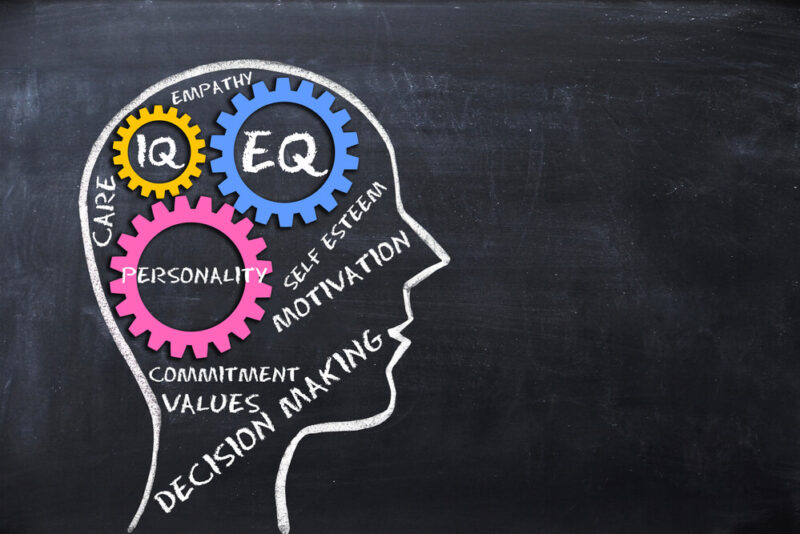Emotional Intelligence: A Key Competency for Modern Insurance Agents

As an insurance agent, your ability to recognize your own emotions and those of your clients can make all the difference in how effectively you can understand your clients’ problems and offer solutions that can help them and their financial circumstances. Here’s the full scoop on emotional intelligence in the insurance industry. If you’d like to put your emotional intelligence to work with the backing of an industry leader, consider becoming a producer with Bluefire Insurance.
What Is Emotional Intelligence and Why Does it Matter?
The key components of emotional intelligence (also known as “EI”) include:
- Self-Awareness: Recognizing and understanding your emotions, strengths, weaknesses, and values.
- Self-Regulation: The ability to control or redirect disruptive emotions and impulses and adapt to changing circumstances.
- Motivation: A passion for work beyond money or status and a propensity to pursue goals with energy and persistence.
- Empathy: The ability to understand the emotional makeup of other people and treat them according to their emotional reactions.
- Social Skills: Proficiency in managing relationships and building networks.
If you can master these essential job skills that help you become a better insurance agent, you’ll find it’s much easier to build trust more rapidly with your clients, figure out their needs, and resolve conflicts with them before they become a bigger problem.
In fact, academic research has backed this up. According to a study published in the Journal of Business and Psychology, emotional intelligence is positively related to job performance, especially in roles that require extensive interpersonal interaction, such as sales and customer service (which just happens to be your job).
The Role of Emotional Intelligence in the Ever-Changing Insurance Landscape
A study published in the Journal of Vocational Behavior found that emotional intelligence is linked to better job performance and adaptability. This is especially valuable in customer-facing roles that require managing interpersonal relationships effectively. That’s how emotional intelligence in sales matters.
That’s important. It means that in a business like insurance — where things are always shifting around — your ability to adapt to your clients’ needs makes all the difference in whether you can both build a stable book of business and retain that book for an indefinite period of time.
EI can also help you cope with pressure and maintain your mental well-being in this high-stress field, both of which are necessary to ensure you don’t burn out before you’re able to get the ball rolling.
Harnessing Emotional Intelligence for Enhanced Customer Interactions
Now, the question you’re probably wondering about is how you can take these ideas and concretely apply them to your day-to-day interactions with your clients. Here are a few strategies to consider:
- Personalize Greetings: Use the client’s name and personalize your greeting to make them feel valued. For example, instead of a generic “Hello,” say “Hi [Client’s Name], how can I assist you today?”
- Small Talk: Engage in light conversation to build rapport. This might include asking about their well-being, family, or interests, which can make the interaction more personable and friendly.
- Listen Attentively: Focus on what the client is saying without interrupting. Use non-verbal cues, such as nodding or maintaining eye contact, to show you are actively listening.
- Stay Solution-Focused: When addressing client concerns, focus on finding solutions rather than dwelling on the problem. Collaborate with the client to identify the best course of action.
- Stay Connected: Maintain regular contact with clients through emails, newsletters, or calls to keep them informed and engaged. Personalized communication fosters a strong client relationship.
Tailoring Insurance Solutions with an Emotionally Intelligent Approach
Sales professionals who utilize emotional intelligence in client interactions are more successful in building long-term relationships and closing sales. Why is that?
It’s because when you take the emotionally intelligent approach, your solution will not only address your clients’ financial needs but also their need for their problems to be recognized.
Use this insight to customize insurance products and services, ensuring that recommendations align with their specific requirements and life stages. Communicate options clearly, avoiding jargon, and be transparent about the benefits and limitations of each option.
Throughout the process, remain flexible and responsive to any changes in the client’s needs, continuously engaging them in meaningful conversations to adapt solutions as necessary. By fostering trust and demonstrating genuine care, you build lasting relationships and enhance client satisfaction.

Cultivating a Thriving Work Environment Through Emotional Intelligence
Cultivating a thriving work environment through emotional intelligence involves fostering open communication, collaboration, and empathy among team members, leading to higher job satisfaction and productivity. Leaders can achieve this by promoting self-awareness and self-regulation, encouraging employees to understand and manage their emotions effectively. This will create a supportive, dynamic work environment that empowers employees to thrive.
Emotional Intelligence as a Cornerstone for Team Collaboration
Teams with high emotional intelligence are better at conflict resolution and exhibit greater cohesion and cooperation, which contributes to a positive workplace atmosphere.
Additionally, a study published in the Journal of Applied Psychology found that emotional intelligence and leadership focused on EI significantly enhances employee engagement and motivation, leading to improved performance and reduced turnover. Organizations that prioritize emotional intelligence in leadership development and team interactions have greater success.
So, how does this apply to you and your agent career? The key is to collaborate with your colleagues to get the job done right the first time around rather than putting tension on your team. Remember, as an agent or broker, you’re the first line of defense when it comes to new client business, but you’re only one part of a larger, well-oiled machine that works to serve your clients. Building rapport actively with your team members across the business will serve you well in the long run.
Essential EI Strategies for Leadership and Management Success in Insurance
Consider these strategies when it comes to “leading from the front” at your agency:
- Set a Vision: Articulate a clear and inspiring vision for the team and organization, motivating team members to align their efforts with organizational goals.
- Recognize Achievements: Celebrate successes and recognize individual and team achievements, reinforcing positive behaviors and boosting morale.
- Understand Team Needs: Take the time to understand the individual needs, motivations, and challenges of team members, showing genuine care and concern for their well-being.
Building Your Emotional Intelligence Skill Set
Some great sales skills books on the topic include:
- “Emotional Intelligence 2.0” by Travis Bradberry and Jean Greaves
- “The Emotionally Intelligent Leader” by Daniel Goleman
- “The EQ Edge: Emotional Intelligence and Your Success” by Steven J. Stein and Howard E. Book
Other approaches include taking psychology courses and attending relevant seminars. Remember to consider incorporating monthly therapy or professional coaching into the mix, too!
Join Our Team of Independent Insurance Agents
We can’t understate the importance of business emotional intelligence (EI) for insurance agents like you, including its role in client interactions, leadership, and adapting to industry changes. By developing your own EI for personal and professional development, you can take advantage of these practical strategies for enhancing empathy, communication, and relationship-building skills in this competitive business.
Remember the key lesson from all these EI topics: Becoming an active, patient listener. The more you listen to your clients and colleagues, the more information you will gain that will enable you to provide the right types of solutions for their insurance needs. It’s all about becoming a “professional information gatherer” — someone who listens for a living.
Ready to take the next step in your career as an emotionally intelligent independent agent? We’re here to help at Bluefire. If you are interested in becoming a Bluefire producer, send us a message. We also have plenty of tips for agents in all phases of their career, from new to established. Just take a look at our Bluefire Knowledge Center.
Related Articles
-
August 7th 2023
The Top 10 Biggest Issues Auto Insurance Agents are Facing Today
In the post-pandemic world, insurance agents face numerous new challenges, as well as some old ones. In[...]
-
June 23rd 2025
How Bluefire Insurance Empowers Agents with Data and Insights to Sell Smarter
In today’s hyper-competitive insurance marketplace, you’re no longer just an agent. You’re also a data analyst, marketer,[...]
-
June 9th 2025
Challenges Independent Insurance Agents Face (and How Bluefire Solves Them)
As an independent insurance agent, you play a vital role in the insurance industry. You offer your[...]
-
May 19th 2025
The Power of Storytelling — How Personal Stories Can Help Sell Insurance
In the insurance industry, numbers matter, but stories sell. You already know that coverage options, deductibles, and[...]




